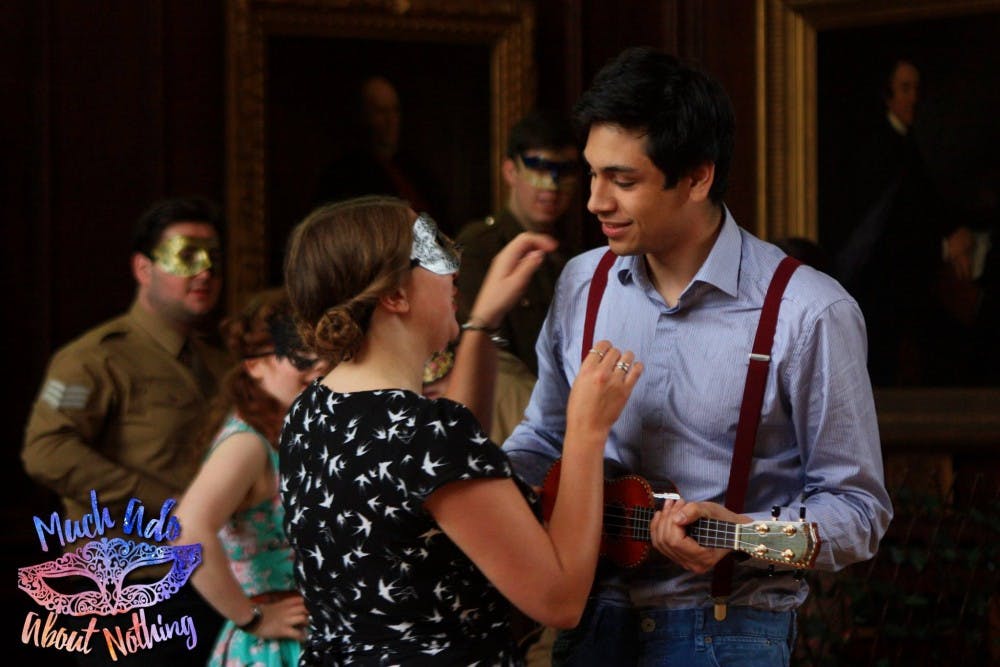Bringing a decidedly British sensibility from across the pond, the Castle Theatre Company will be performing "Much Ado About Nothing" at Duke and Durham Sept. 14-16.
CTC hails from our sister city of Durham, England, and has a history of classical Shakespeare productions spanning three decades. Fresh from their acclaimed tour in southern England, CTC promises to delight American audiences with—in the words of show director Kate Barton—a “quite quirky” spin on one of the Bard’s greatest comedies.
“As a director you can’t really get anything original out of Shakespeare,” Barton said, but this is more understatement than cynicism.
Make no mistake, CTC’s "Much Ado" takes plenty of risks: the show is set in 1940s Britain, to channel the excitable atmosphere and sudden modernization of the postwar era. The play is performed outdoors on a minimalist set, with occasional music.
But this production is old-fashioned at heart, and proudly so. A thread of British heritage and history runs through the play, plus a delicious sense of whimsy. The show harks back to the Victorian tradition where, as Barton put it, “they’d have their players come onto the croquet lawn and perform Shakespeare in the summer sun.”
Dramatically, CTC’s interpretation also signals a return to fundamentals. The company works to achieve a simplicity that comes with a renewed appreciation of characters, acting and the mechanisms of comedy.
“I’d put more emphasis on the timeless nature [of the material]: it is about deception and love and folly, and in that sense it is quite archetypal,” actor Tom Harper, who plays the villain Don John, said.
The key relationship between characters Benedick and Beatrice, for instance, is where this production finds its strength. Described as two startling individuals that come from nowhere, the couple Benedick and Beatrice are unique in the Shakespearean canon. They share a relationship of equals that transcends gender.
Joseph Porter, professor in the department of English, noted the proto-feminism in Beatrice and concurred with CTC’s reading.
“The idea of the ‘merry war’ between this young man and woman makes ["Much Ado"] interesting,” Porter said. “They take such pleasure in flirting by insult, it’s almost like a revelation of how our minds work.”
CTC’s attention to characters extends to casting as well. There is a bit of gender-bending, but Barton maintains this is about good drama and not making a statement.
“We want to have open minds and create a natural sense of fun," Barton said. "For example, Dogberry has to hold the audience in attention, and we just cast the right person.”
With its strong—almost purist—focus on aesthetic and craft, CTC offers a provocative contrast to the regular fare at Duke.
“We’re anti-classic, we’re deconstructionists,” said Jaybird O'Berski, assistant professor of the practice of Theater Studies and artistic director of the campus company Antic Shakespeare. “You start with the words and the incredible story. But you always have to make it new.”
Junior Colleen Sharp, who played Juliet in Antic Shakespeare’s production of "Romeo and Juliet" this February, believes that Duke students will identify with a great deal in CTC’s "Much Ado." Yet, there remains a tangible difference in philosophy: Antic Shakespeare prefers to deconstruct and revise and to make statements that are relevant to Duke students now.
Either way, British and American thespians can all agree on the importance of getting the comedy right. CTC embraces the silliness in "Much Ado." In the end, their goal is for the audience to come away with a good sense of fun.
“There is so much of slapstick humor,” Barton said. “When you read it it makes no sense—there is nothing really going on text-wise—which is then very fun to put it into a visual context.”
This "Much Ado" also has a broader significance, both at home and overseas. It is the next step for DukeEngage Durham-Durham: since 2012, Duke students have been visiting our Sister City every summer to do community service. This visit will further strengthen the bond between Duke and Durham University, and hopefully anticipate more student collaborations in the future.
“I’m excited for their students to meet our students, and I’m hopeful our students will get to experience their gifts and learn from them,” said Sam Miglarese, director of community engagement in Duke’s Office of Durham & Regional Affairs (DARA). “Also it is a word of thanks to Durham University, for the way they’ve welcomed our students in England.”
But the outreach doesn’t stop there. Notably, CTC will perform at the Durham School of the Arts, and conduct workshops for high school students there. This is part of a larger, ongoing convergence where Duke and Durham connect via theater. DARA’s community arts programs are going strong, and today there are more ways for Duke’s theater buffs to venture out into the community.
“Despite all the divisions and challenges, this city is alive,” Miglarese said. “And the University is filling in and making that energy even more exciting.”
Castle Theatre Company will perform at The Forest at Duke at Wednesday 7 p.m. and at the Fisher Amphitheatre at Thursday 5 p.m. Admission is free. An additional performance at the Durham School of the Arts will be held Friday 7:30 p.m.
Get The Chronicle straight to your inbox
Signup for our weekly newsletter. Cancel at any time.

